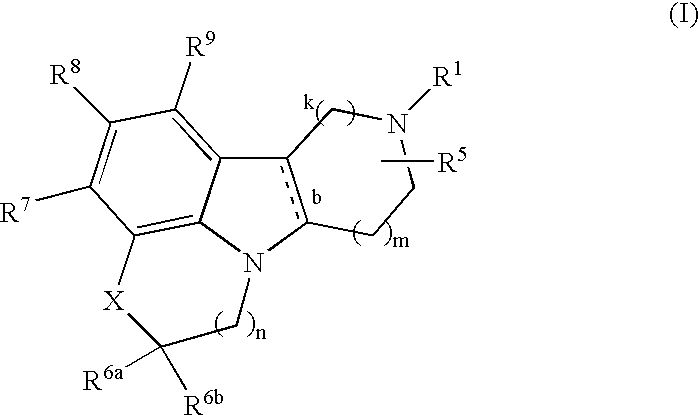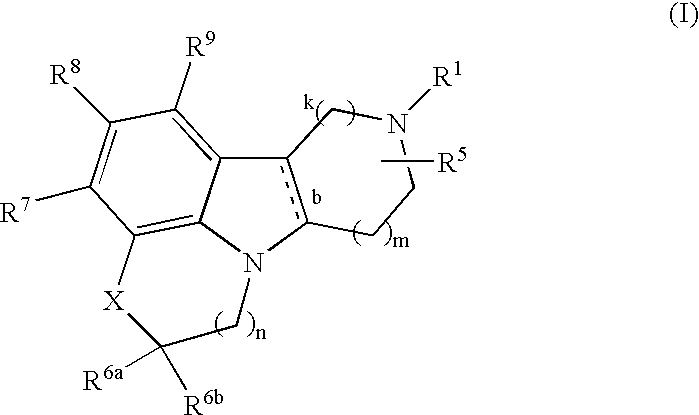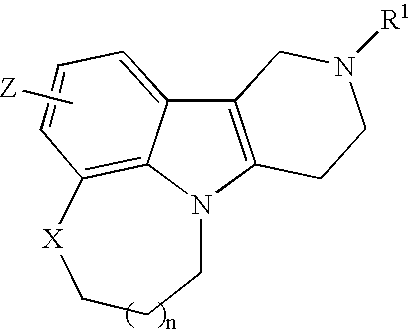Substituted heterocyle fused gamma-carbolines
a heterocyle and gamma-carboline technology, applied in the field of substituted heterocyle fused gamma-carbolines, can solve the problems of detracting from the efficacy of schizophrenia front-line treatment, delayed onset of action, and side effects of treatmen
- Summary
- Abstract
- Description
- Claims
- Application Information
AI Technical Summary
Benefits of technology
Problems solved by technology
Method used
Image
Examples
example 1
4,5,7,8,9,10-hexahydropyrido[4,3-b]pyrrolo[3,2,1-hi]indole hydrochloride
[3560] A mixture of 1-amino-2,3-dihydroindole (1.0 g, 5.9 mmol), piperidone hydrochloride monohydrate (0.91 g, 5.9 mmol) and isopropanol (29 mL) was brought to reflux for 4 hours. The resulting brown solid was filtered and washed with cold diethylether (20 mL) and dried under vacuum, affording the title compound (1.01 g, 74%). 1H NMR (CD3OD, 300 MHz) δ 7.15 (d, 1H, J=7.7 Hz), 6.85-6.96 (m, 2H), 4.39-4.50 (m, 4H), 3.75 (t, 2H, J=7.3 Hz), 3.57 (t, 2H, J=6.2 Hz), 3.15 (t, 2H, J=6.2 Hz) ppm.
example 2
9-cyclopropyl-4,5,7,8,9,10-hexahydropyrido[4,3-b]pyrrolo[3,2,1-hi]indole hydrochloride
[3561] The title compound was prepared by substituting cyclopropylpiperidone for the monohydrate piperidone hydrochloride by the procedure of Example 1 in 64%. 1H NMR (DMSO, 300 MHz) δ 7.16 (d, 1H, J=7.3), 7.85-7.93 (m, 2H), 4.6 (d, 1H, J=6.6), 4.38-4.48 (m, 3H), 3.72-3.85 (m, 1H), 3.7 (t, 2H, J=7 Hz), 3.58-3.62 (m, 1H), 3.0-3.18 (m, 3H), 1.07-1.12 (m, 2H), 0.83-0.9 (m, 2H) ppm.
example 3
(±)-cis-4,5,6a,7,8,9,10,10a-octahydropyrido[4,3-b]pyrrolo[3,2,1-hi]indole
[3562] 4,5,7,8,9,10-Hexahydropyrido[4,3-b]pyrrolo[3,2,1-hi]indole from Example 1 (0.50 g, 2.14 mmol) was stirred under N2 in TFA (15.5 mL) at 0° C. for 10 minutes. NaBH4 (0.44 g, 6.4 mmol) was added slowly keeping the temperature below 2° C. The reaction was allowed to warm to room temperature and stirred overnight. Ice chips were then added and the reaction basified to pH 12 with 50% aqueous NaOH. The aqueous layer was then extracted with CHCl3 (3×20 mL). The combined extracts were washed with brine, H2O and dried (Na2SO4) and evaporated affording the title compound (0.42 g, 100%). 1H NMR (CDCl3, 300 MHz) δ 6.94 (d, 1H, J=7.7 Hz), 6.88 (d, 1H, J=6.9 Hz), 6.63 (t, 7.3, 1H, J=7.3 Hz), 3.64 (dt, 1H, J=8.0, 1.5 Hz), 3.29-3.5 (m, 2H), 3.05-3.29 (m, 3H), 3.03 (dd, 1H, J=11.7, 3.6 Hz), 2.72-3.02 (m, 2H), 1.66-1.90 (m, 2H) ppm.
PUM
 Login to View More
Login to View More Abstract
Description
Claims
Application Information
 Login to View More
Login to View More - R&D
- Intellectual Property
- Life Sciences
- Materials
- Tech Scout
- Unparalleled Data Quality
- Higher Quality Content
- 60% Fewer Hallucinations
Browse by: Latest US Patents, China's latest patents, Technical Efficacy Thesaurus, Application Domain, Technology Topic, Popular Technical Reports.
© 2025 PatSnap. All rights reserved.Legal|Privacy policy|Modern Slavery Act Transparency Statement|Sitemap|About US| Contact US: help@patsnap.com



